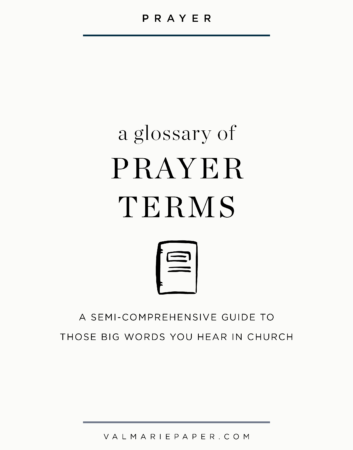 Welcome to our annual Prayer Series! No journal required to benefit from the practical tips you’ll find here, but if you’d like to check out our 2021 prayer journal collection that launched today, click here!
Welcome to our annual Prayer Series! No journal required to benefit from the practical tips you’ll find here, but if you’d like to check out our 2021 prayer journal collection that launched today, click here!
Luckily, you don’t need a college degree to pray! But if you’ve heard some churchy words tossed around in relation to prayer, maybe we can help. The following terms aren’t just for show; they are things we can take action on to grow a healthy prayer life. And if you’re ready to get even nerdier, the second half of this blog post contains all the words used for prayer in the original languages of the Bible. We hope learning about these different variations of prayer might help you shake things up in your prayer life in the very best way! 😉
ADORATION
Biblically, this was a very physical act of worship. For example, to “suddenly prostrate the body” or “gradually inclining the body until the forehead touched the ground” (Smith). Although we can and should express our adoration with physical posture, words of worship and praise to God are vital to our prayer life. Click here to read a whole blog post on this subject!
AMEN
This traditional closing to prayer is the transliteration of a Hebrew word that means “faithful, reliable, or believable”. Jesus uses it when he says, “‘truly I say to you,’ on nearly seventy occasions in the Gospels.” (Elwell) When we say it at the end of our prayers, we are basically saying, “It is true.” or “Let it be so.” It is not a magic word, but a declaration that we believe what we are praying and who we are praying to.
CONFESSION
“An acknowledgment of sins to God.” (Easton) Psalm 51 is an example of a prayer of confession from David after his affair with Bathsheba. John 1:9 says, “If we confess our sins, he is faithful and just to forgive us our sins and to cleanse us from all unrighteousness.” If our prayers aren’t flowing, it could be because we’re in need of some time of confession. Grab a notebook (or the Conversations space in our spiral prayer journals) and start writing the little and big things that come to your mind.
CORPORATE PRAYER
Praying together as the body (‘corpus’ in Latin) of Christ. In Acts 2:42, we see that the earliest Christians “devoted themselves to the apostles’ teaching and to the fellowship, to the breaking of bread and to prayer.” Have some anxiety about praying with others? Our online prayer course has a whole module on this!
FASTING
“Abstinence from food and/or drink as an element of private or public religious devotion… an expression of personal devotion linked to three major kinds of crisis in life: lamentation, mourning, and petition.” (Elwell) Read our beginner’s guide to fasting here.
INTERCESSION
“[P]rayer on behalf of another… not merely prompted by affection and interest, but recognizing that God’s relation to man is not merely individual, but social.” (Orr) In intercession, we stand in the gap for those who need the Lord’s help or healing. This definition points out that we should recognize that our faith should recognize the community we have in God’s kingdom. We have a module on this in our prayer course!
LAMENTATION
“The passionate expression of grief or sorrow; weeping.” (Oxford Languages) In the Bible, this is usually written in poetic form, but poet or not, we are invited to pour out our hearts to God. “The LORD is close to the brokenhearted and saves those who are crushed in spirit.” (Psalm 34:18)
PETITION
To ask or request. As seen in 1 John 5:15, “And if we know that he hears us—whatever we ask—we know that we have what we asked of him.”
PRAYER WARRIOR
A person who knows that “our struggle is not with flesh and blood” (Eph. 2:12) and fights in prayer for God’s ultimate will to happen in her own life, in the lives of those around her, and in the world beyond her.
SUPPLICATION
“The action of asking or begging for something earnestly or humbly.” (Oxford Languages) In the ACTS prayer model, this is where we pray for those things we desire and need.
THANKSGIVING
Giving gratitude to God. “Thanksgiving is a motive for Christian life and conduct, a general attitude toward both the blessings and trials of life, a central component of prayer and the context for the proper use of material things.” (Elwell)
HEBREW WORDS FOR PRAYER IN THE OLD TESTAMENT
‘Atar: Childlike confidence in and reliance on God.
They were helped in fighting them, and God delivered the Hagrites and all their allies into their hands, because they cried out to him during the battle. He answered their prayers, because they trusted in him. -1 Chronicles 5:20
Palal: Calling on God to evaluate and intervene. (The most common word in the OT for prayer.)
I call on you, my God, for you will answer me; turn your ear to me and hear my prayer. -Psalm 17:6
Paga’: Coming freely and making contact with God.
For he bore the sin of many, and made intercession for the transgressors. -Isaiah 53:12
Shama’: Confident expectation of God’s response. It is sometimes used in the sense of answering prayer.
Does he who fashioned the ear not hear? -Psalm 94:9
Sha’al: To ask for God’s guidance or to seek a specific favor.
He inquired of the Lord, saying, “Shall I go and attack these Philistines?” -1 Samuel 23:2
Sha’ela: Earnest prayer for something important.
I prayed for this child, and the Lord has granted me what I asked of him. -1 Samuel 1:27
Mish’ala: To petition or to desire.
Take delight in the Lord, and he will give you the desires of your heart. -Psalm 37:4
Hanan: To ask God to be gracious and kind.
To you, Lord, I called; to the Lord I cried for mercy. -Psalm 30:8
T’hinna: A formal appeal for grace and mercy.
Hear the supplication of your servant and of your people Israel when they pray toward this place. Hear from heaven, your dwelling place, and when you hear, forgive. -1 Kings 8:30
Tahanun: An emotional appeal for grace and mercy.
A cry is heard on the barren heights, the weeping and pleading of the people of Israel, because they have perverted their ways and have forgotten the Lord their God. -Jeremiah 3:21
‘Ana: A cry to God for deliverance.
Answer me when I call to you, my righteous God. Give me relief from my distress; have mercy on me and hear my prayer. -Psalm 4:1
Na’: A particle indicating a phrase is a prayer.
As seen in hosanna which means, “O save us!”
GREEK WORDS FOR PRAYER IN THE NEW TESTAMENT
Proseuchomai: The basic word for prayer of any kind. Peter sent them all out of the room; then he got down on his knees and prayed. Turning toward the dead woman, he said, “Tabitha, get up.” She opened her eyes, and seeing Peter she sat up. -Acts 9:40
Peter sent them all out of the room; then he got down on his knees and prayed. Turning toward the dead woman, he said, “Tabitha, get up.” She opened her eyes, and seeing Peter she sat up. -Acts 9:40
Aiteo: To seek from God because He cares for us as a Father.
But I know that even now God will give you whatever you ask. -John 11:22
Deomai: To ask, confident of God’s grace and favor.
While Jesus was in one of the towns, a man came along who was covered with leprosy. When he saw Jesus, he fell with his face to the ground and begged him, “Lord, if you are willing, you can make me clean.” -Luke 5:12
Erotao: To seek guidance or response from a close Friend.
Jesus left the synagogue and went to the home of Simon. Now Simon’s mother-in-law was suffering from a high fever, and they asked Jesus to help her. -Luke 4:38
Gonypeteo: To fall on one’s knees and urgently request help.
A man with leprosy came to him and begged him on his knees, “If you are willing, you can make me clean.” -Mark 1:40
Aineo: To express gratitude.
He jumped to his feet and began to walk. Then he went with them into the temple courts, walking and jumping, and praising God. -Acts 3:8
Eucharisteo: To express gratitude to God.
Then he took a cup, and when he had given thanks, he gave it to them, saying, “Drink from it, all of you. -Matthew 26:27
COMING NEXT: Prayer and the Early Church
CATCH UP ON:
Why Prayers Go Unanswered
Praying in Community
__
Easton, Matthew George. “Entry for Confession”. “Easton’s Bible Dictionary”. .
Elwell, Walter A. “Entry for ‘Thankfulness, Thanksgiving'”. “Evangelical Dictionary of Theology”. . 1997.
Richards, Lawrence O. “Every Prayer and Petition in the Bible”. . 1998.
Smith, William, Dr. “Entry for ‘Adoration'”. “Smith’s Bible Dictionary”. . 1901.
Orr, James, M.A., D.D. General Editor. “Entry for ‘INTERCESSION'”. “International Standard Bible Encyclopedia”. 1915.












Leave a Reply
Comments (0)